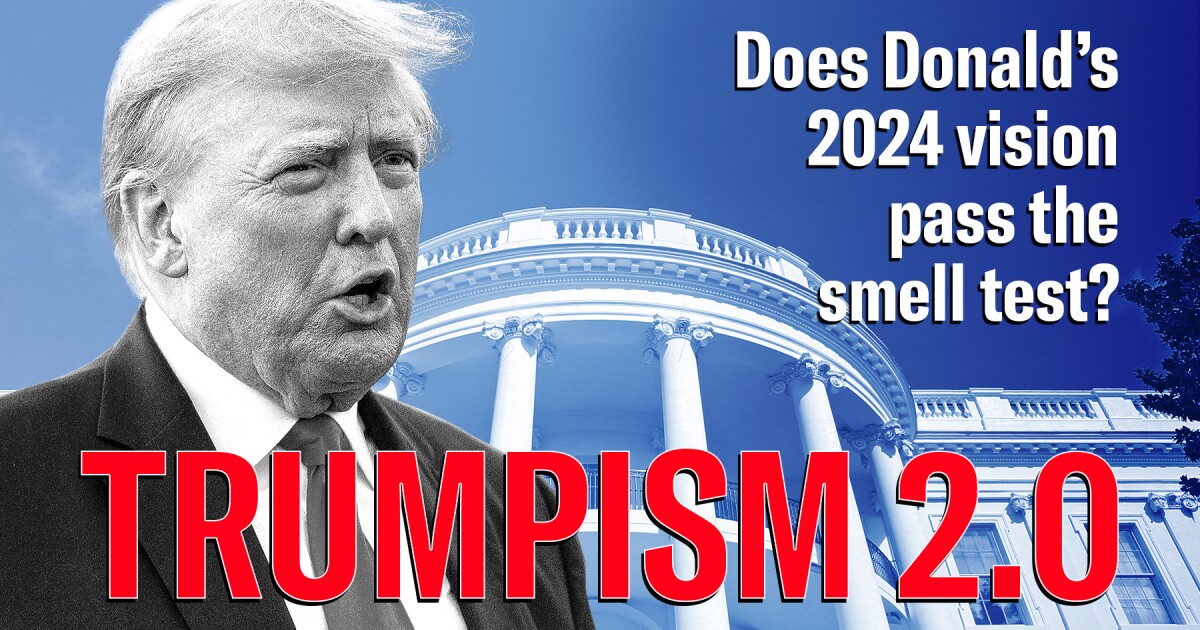

Donald Trump’s 2016 flagship policy was famously “Build the Wall.” The early rounds of the 2024 campaign have been dominated by Trump’s stranglehold over the competition, as well as his multiple court cases. Underneath the bluster and chaos, the former president has rolled out a significant number of new policy proposals that have gone without scrutiny, until now. This Washington Examiner series, Trumpism 2.0, will take a closer look at this policy, if it’s realistic, and if it’ll help Trump secure a second term.
Donald Trump has a lot of ideas for 2024.
While he’s much better known for his personality and bombast, the former president has released a slew of policy proposals for a potential second term, some basic GOP orthodoxy and others far from the mainstream of conservative thought. But how many of them are realistic?
INFLATION TICKED UP TO 3.7% IN AUGUST, DRIVEN BY GAS PRICES
All presidential candidates make promises on the campaign trail. Things tend to look a lot different once they enter the Oval Office. Unlike most, Trump has firsthand experience of the limits of presidential power and unfulfilled campaign promises, though he’s put forward an ambitious agenda nonetheless.
Trump is far ahead of his Republican rivals in primary polling, and dead even with President Joe Biden, so his ideas should be taken seriously. Whether they should be taken literally is another question.
Build the Wall — Around the U.S. economy
Trump’s call for an across-the-board 10% tariff on all foreign goods may be his 2024 version of build the wall.
“When companies come in and they dump their products in the United States, they should pay, automatically,” he said. “I do like the 10% for everybody.”
This idea is largely a continuation of the trade policy initiatives Trump pursued during his first term, such as implementing tariffs on China and renegotiating the North American Free Trade Agreement.
Those moves indicated that Trump doesn’t need congressional approval to put tariffs in place and also speak for his willingness to implement them.
A 10% tariff could definitely put a dent in the national debt, according to the budget-focused Committee for a Responsible Federal Budget.
“We estimate this policy could raise approximately $2.5 trillion over the Fiscal Year (FY) 2026 to 2035 budget window under conventional scoring,” the nonprofit group wrote in an analysis of the proposal.
However, the group also estimates the policy would hurt economic growth — Trump disputes this — making the actual gains closer to $2 trillion.
“Depending on whether or not these economic effects are incorporated, we estimate the policy would reduce debt as share of Gross Domestic Product (GDP) in FY 2035 by 4 to 7 percentage points,” CRFB wrote.
Under current law, most imports are not subject to customs duties, so the policy would be a major change, harkening back to a pre-Great Depression approach that aimed to protect domestic industry.
But Tax Foundation analyst Erica York has a mostly negative take on the idea, saying it will effectively raise taxes by $300 billion a year.
“Whatever channel the tariffs take, Americans become poorer,” York wrote. “In turn, the actual revenue collected by the government would be less than $300 billion because other tax revenues would fall.”
Trump has also called for Congress to pass the Reciprocal Trade Act, which would allow him to unilaterally impose tariffs of equal size to any tariffs placed by other countries on the United States.
Clawbacks and Impoundment
Trump’s high tariffs could perhaps lower the trade deficit and the national debt, but he’s not a budget hawk.
The Donald did not prioritize the national debt as president, and the deficit rose in each of his four years in office, including by a record-setting $3.1 trillion in the pandemic year of 2020. He has continued along that path by promising not to “cut a single penny” from Social Security and Medicare if elected.
Biden has promised much the same and has repeatedly accused Republicans of trying to slash the entitlement programs, even though both are fast on their way to insolvency. In any case, doing nothing is a realistic policy proposal from Trump.
Trump is on shakier ground in calling to bring back impoundment, by which the president could refuse to spend any excess funding appropriated to the executive branch in a given year.
“For 200 years under our system of government, it was undisputed that the president had the Constitutional power to stop unnecessary spending through what is known as impoundment,” Trump said in proposing the idea.
This topic is timely as trillion-dollar spending bills Congress issued during the pandemic have left some government agencies with massive amounts of unspent funds.
Despite Trump’s bullishness on the idea, another CRFB analysis calls it into question. The Congressional Budget and Impoundment Control Act of 1974, as the name implies, limited presidential impoundment authority. Trump has promised to challenge the constitutionality of this act in court.
How Trump would use any impoundment powers raises additional questions.
“On one hand, he claims his use of impoundment authority would reduce deficits and slow inflation,” the CRFB analysis reads. “On the other hand, President Trump also suggests deferred or rescinded funds would be used to pay for tax breaks or to strengthen Social Security and Medicare, negating any deficit reduction.”
A third fiscal proposal involves asking Congress to provide young parents with “baby bonuses” to “help launch a new baby boom.” America’s falling birth rate is a well-documented phenomenon, and pro-family policies have recently demonstrated bipartisan popularity, though getting anything through Congress will be a tall order.
Law and Order 2.0
“I am the law and order candidate,” Trump said on the 2016 campaign trail. His 2024 proposals indicate that’s going to be the case again.
Trump has major policy proposals around crime and the leaky southern border, both of which are top issues for GOP voters.
Perhaps most notably, Trump is calling for the death penalty for drug dealers and human traffickers. But his ideas go much further even than that.
Trump wants to ban urban camping where possible to combat homelessness, combined with creating tent cities and bringing back the mental institutions that were largely abandoned in the 1960s and ’70s. He also wants to see a “full naval embargo” and the deployment of military assets to “inflict maximum damage” on drug cartels.
“We’re going to be asking everyone who sells drugs, gets caught selling drugs, to receive the death penalty for their heinous acts,” Trump said last November. “Because it’s the only way.”
But it may not be a realistic way.
University of Notre Dame Law professor Jimmy Gurule told NPR there are several reasons Trump could not kill drug dealers. One is that drug offenses are often prosecuted at the state, rather than federal, level. Another is that Trump would need to convince Congress to pass a death penalty bill, which is a long shot at best. Gurule rated the idea “not a serious recommendation” and said it’s likely designed to generate headlines.
Notably, Trump has been less vocal about the proposal since it first made the news in late 2022.
Trump has called for lesser proposals like directing more money to police officers, something Biden has already done and thus is within the president’s power. Trump’s calls to increase liability protections for law enforcement officers would face a tougher road given that it would involve Congress and there are still concerns about the abuse of police powers, especially among Democrats.
He promises to “fully secure the border,” which may not be possible in a literal sense but likely indicates tougher enforcement compared to the record-breaking number of border crossings under Biden.
Finally, Trump vows to target “Soros prosecutors,” replacing some at the federal level with his own appointments when possible and ordering the Department of Justice to investigate elected district attorneys elsewhere.
Sean Kennedy, a visiting fellow at the Maryland Public Policy Institute, said because law enforcement is largely a state and local function, the federal government would need to show that prosecutors were somehow inhibiting federal law enforcement.
One tactic could involve threatening federal funds for noncompliance, which former Attorney General Jeff Sessions attempted to do with U.S. Immigration and Customers Enforcement. That effort largely failed as judges ruled it illegal.
“Now that Trump judges [have] taken office across the country since then, maybe we’ll see a friendlier judiciary say, ‘No, the federal government has total power to claw back grants if you are not compliant with their directives. You’re not entitled to the free money,’” Kennedy said.
Culture War
Debates over social and cultural issues have arguably escalated since 2016 and will almost certainly be a bigger deal than they were during 2020 when COVID-19 dominated.
Gov. Ron DeSantis (R-FL) is often regarded as the GOP culture war king, though Trump puts meat on the bones of his policy proposals in this area.
Trump has called for banning transgender surgeries for minors, something a handful of red states have already done. This would require the involvement of Congress, as would his calls to pass a bill establishing that there are only two genders, that they are assigned at birth, and that Title IX prohibits men from participating in women’s sports.
These ideas are not likely to pass unless Republicans win huge majorities in the legislature.
Trump has promised to sign an executive order instructing all federal agencies to cease programs that promote the concept of sex and gender transition and to cut funding to schools promoting critical race theory. This is a promise he’s made repeatedly on the campaign trail.
President Trump in South Carolina: “On Day One, I will sign a new executive order to cut federal funding for any school pushing critical race theory, transgender insanity, and other inappropriate racial, sexual, or political content on our beautiful children.” pic.twitter.com/bcJIaIOr7d
— MAGA War Room (@MAGAIncWarRoom) August 6, 2023
As president, Trump can certainly sign the order, but whether it survives legal scrutiny is another matter.
Biden is working now to reinterpret Title IX to limit how far states can go with gender-based athletics restrictions, and Trump would be empowered to end that effort upon taking office.
Trump has also targeted teachers unions and the Department of Education, both frequent conservative punching bags, by calling to abolish tenure for teachers up to 12th grade and reducing the number of school administrators.
Tilting at Wind Mills
Trump memorably sparred with Biden over windmills in 2020, saying, “I know more about wind than you” and that wind power “kills all the birds.” Biden likes to reference a Trump joke about the issue by reminding voters that windmills do not cause cancer.
This time around, it’s electric cars that may drive the biggest green energy wedge between the two.
Trump is hoping to peel off Midwestern voters, manufacturing union members, and blue-collar workers by promising to end Biden’s electric vehicle push.
“I think you’d better endorse Trump because I’m going to grow your business and they are destroying your business,” he said in a video released in July. The spot called for an endorsement from the United Auto Workers.
The UAW is concerned that the transition to electric vehicles will leave its members behind and is one of only a few unions that has yet to endorse Biden. Trump is also calling to roll back fuel efficiency standards the Biden administration has proposed.
As president, Trump could have the Department of Transportation reevaluate gas standards, but some electric vehicle proposals would be trickier to back out of.
Congress passed the Inflation Reduction Act, which includes subsidies for electric vehicles made in the U.S., in 2022. Republicans, including Trump, have called for rescinding it, which will be much easier said than done.
ClearView Energy Partners managing director Kevin Book told Politico that the IRS and Treasury Department could reinterpret parts of the law in a different presidential administration but predicted the law itself will remain in effect.
CLICK HERE TO READ MORE FROM THE WASHINGTON EXAMINER
As far as Trump’s call for an endorsement from the UAW, that ranks among one of his more far-fetched ideas.
UAW President Shawn Fain has said another Trump presidency would be a “disaster.”





